Note: I used an italicized ‘Orwell’ when talking about the game as a whole and ‘Orwell’ when talking about specifics of the governmental program within the game.
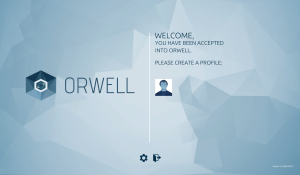 Over break I bought a game called Orwell: Keeping an Eye on You. I had never heard of this game before but it was recommended to me on Steam. I took a look at the store page to read the description and watch a trailer. My interest was instantly piqued as the developers offered a type of gaming experience I had never seen or thought of before. Also it was on the Steam Winter Sale for 4 dollars, so I decided why not?
Over break I bought a game called Orwell: Keeping an Eye on You. I had never heard of this game before but it was recommended to me on Steam. I took a look at the store page to read the description and watch a trailer. My interest was instantly piqued as the developers offered a type of gaming experience I had never seen or thought of before. Also it was on the Steam Winter Sale for 4 dollars, so I decided why not?
Orwell takes you on a journey that looks all too familiar – your computer screen. The first thing you see when opening the game is a page dedicated to making your profile. You are congratulated on being accepted into the Orwell Program. After you enter your avatars information – name, picture, and email – you must accept Orwell’s Terms of Service. Here the player is given a bit more information about the game – that you will be providing information to the government of The Nation and that your choices on what information you provide will have severe impacts.
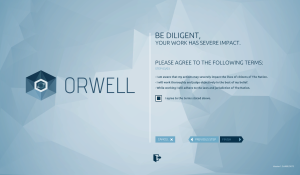 Orwell is a secret government program, known only to the public as a security task force that was established under the Safety Bill. This bill was passed by The Party after political turmoil including a power vacuum in 2008 and two current terrorist bombing supposedly from the neighboring nation of Parges. The bill states, “[it] is the simplified, sped-up process of taking investigative measures against criminal suspects and their prosecution, as well as the provision of an increased budget for safety-related expenses. The Safety Bill also paved the way for stricter regulations concerning immigration and general travel into or transiting through the Nation.” Sounds familiar, right?
Orwell is a secret government program, known only to the public as a security task force that was established under the Safety Bill. This bill was passed by The Party after political turmoil including a power vacuum in 2008 and two current terrorist bombing supposedly from the neighboring nation of Parges. The bill states, “[it] is the simplified, sped-up process of taking investigative measures against criminal suspects and their prosecution, as well as the provision of an increased budget for safety-related expenses. The Safety Bill also paved the way for stricter regulations concerning immigration and general travel into or transiting through the Nation.” Sounds familiar, right?
Orwell could be described as a surreal point and click adventure as all you do in the game is drag and drop information, called datachunks, to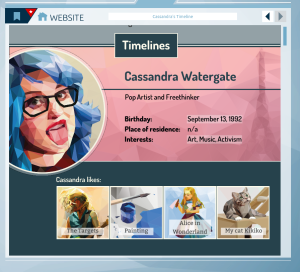 the Orwell servers, read, read some more, read a lot more, and browse the web. The only interaction is with the left mouse button. I know that sounds boring, and admittedly for some people it definitely will be, but I am having fun with it (I am currently halfway through the game). It is how the story is implemented, and your decisively unethical role it in, that makes it truly intriguing. In attempt to prevent a third bombing and discover who is behind the terrorist attacks you are given access to emails, peoples’ computers, medical records, peoples accounts, and you can listen in on phone conversations and read text messages. Orwell explores real-life, modern concerns regarding governmental access, privacy, and informational bias in the guise of public safety.
the Orwell servers, read, read some more, read a lot more, and browse the web. The only interaction is with the left mouse button. I know that sounds boring, and admittedly for some people it definitely will be, but I am having fun with it (I am currently halfway through the game). It is how the story is implemented, and your decisively unethical role it in, that makes it truly intriguing. In attempt to prevent a third bombing and discover who is behind the terrorist attacks you are given access to emails, peoples’ computers, medical records, peoples accounts, and you can listen in on phone conversations and read text messages. Orwell explores real-life, modern concerns regarding governmental access, privacy, and informational bias in the guise of public safety.
So far as a result of my actions I and the government have ruined a relationship and jailed and unethically interrogated a women with depression. Deciding which information to provide Orwell is extremely difficult. Especially when there is conflicting information and you must decide what the “correct” data is and when innocent lives are stake – both those threatened by an impending bombing and those being threatened by the player’s actions. Playing the game is interesting but also makes you feel sleazy; questioning your every move.
The gravity of this is all the more cemented as you are eerily only given contact to your direct superior. His name is Symes and at many times he makes extremely biased accusations before knowing all the information. He has been severely incorrect on many occasions and while he does convey important questions to the player, these statements are laced with his snap judgements that are posed as immediate answers. He is an annoying persona in the game that is sadly representative of certain individuals in our society.
It was frightening how much of the game seemed to resemble the current state of the world. I understand this was the intention, but what I mean is how unsettling playing the game was because it felt too real. Granted the hacking and listening in on phone conversations is beyond my normal day’s repertoire, but extensively reading news articles, reading peoples Timelines (the games version of Twitter), and visiting public websites to garner more information on institutions and programs was extremely relatable. I actually felt bad playing this game over the course of two days because I felt like I was reading more news in this fictitious world than in reality.
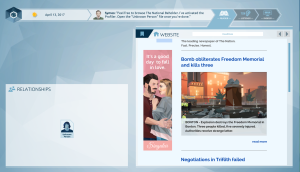 At this point, I am not sure where the developers are headed with the story, or even more so their intentions. It is clear that playing the game is supposed to be difficult, unnerving, and a warning of the possible representation for our future world. However, based on the players’ success with handling the bomb threats and discovering those responsible, the game could also be read as anti-privacy and pro-governmental access and control. Again, I am not sure as I am only halfway through the game. Maybe it will be both and is merely a means to explore both sides of this idea. What is certain is that the game easily mocks our digital age and its inflation with “fake news”, misinformation, and pointing fingers. It is an intriguing, yet scary, analysis of unethical implementations and probing observations into our privacy that represents a daunting, unfortunate and real possibility for society.
At this point, I am not sure where the developers are headed with the story, or even more so their intentions. It is clear that playing the game is supposed to be difficult, unnerving, and a warning of the possible representation for our future world. However, based on the players’ success with handling the bomb threats and discovering those responsible, the game could also be read as anti-privacy and pro-governmental access and control. Again, I am not sure as I am only halfway through the game. Maybe it will be both and is merely a means to explore both sides of this idea. What is certain is that the game easily mocks our digital age and its inflation with “fake news”, misinformation, and pointing fingers. It is an intriguing, yet scary, analysis of unethical implementations and probing observations into our privacy that represents a daunting, unfortunate and real possibility for society.


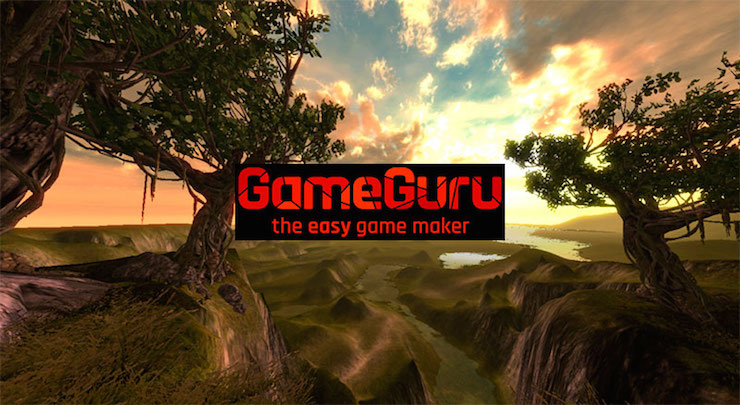


One thought on “Saving and Destroying Lives One Click at a Time: Privacy and The Government”
Thank you. Good analysis – looking forward to more…….